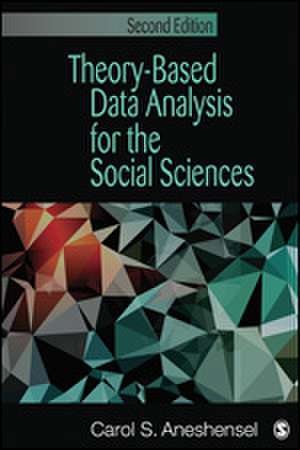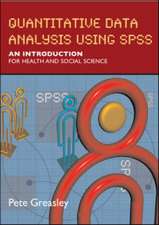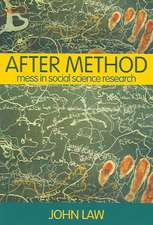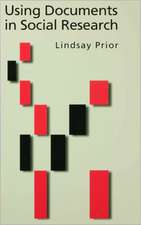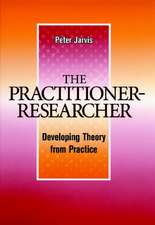Theory-Based Data Analysis for the Social Sciences
Autor Carol S. Aneshenselen Limba Engleză Paperback – 4 feb 2013
Preț: 570.98 lei
Preț vechi: 671.74 lei
-15% Nou
Puncte Express: 856
Preț estimativ în valută:
109.27€ • 113.39$ • 91.33£
109.27€ • 113.39$ • 91.33£
Carte tipărită la comandă
Livrare economică 17-31 martie
Preluare comenzi: 021 569.72.76
Specificații
ISBN-13: 9781412994354
ISBN-10: 1412994357
Pagini: 472
Ilustrații: Illustrations
Dimensiuni: 187 x 232 x 23 mm
Greutate: 0.84 kg
Ediția:Second Edition
Editura: SAGE Publications
Colecția Sage Publications, Inc
Locul publicării:Thousand Oaks, United States
ISBN-10: 1412994357
Pagini: 472
Ilustrații: Illustrations
Dimensiuni: 187 x 232 x 23 mm
Greutate: 0.84 kg
Ediția:Second Edition
Editura: SAGE Publications
Colecția Sage Publications, Inc
Locul publicării:Thousand Oaks, United States
Recenzii
“In clear and accessible prose, this book presents a compelling logic for the analysis of non-experimental data. In the process, it clarifies the concepts of statistical association, confounding, and statistical control, and it provides really compelling elaboration schemes to make substantive, rather than purely statistical, sense of it all. It also provides a means for making causal assertions when the criteria of association, causal priority, non-spuriousness, and theoretical rationale are met.”
“This text does a superb job of explaining critical concepts such as mediation, moderation, spuriousness, and control variable, using graphic illustrations as well as published articles as examples. I think the illustrated examples are really helpful for illuminating these concepts. Furthermore, the majority of empirical research in the social behavioral sciences utilizes regression, logistic regression, and path analysis. The book discusses many empirical articles utilizing these analytic approaches as examples. Thus, the contents of this book are highly relevant and understandable for those in early stages of research training.”
I think this is a very much awaited book. I think it is very well suited for PG level, particularly for those MA students who are writing their dissertations (and PhD students as well). As strange as it may seem, students struggle to understand what theory is and how it relates to data. For me this book engages comprehensively in these questions. There is a good discussion of how to work with variables, about the construction of associations and causalities. I wish I could teach more of this book in my MA course, but due to time constraints I would definitely recommend Chapter 1-4 (where the focus is on conceptual discussion). The book is very helpful for those constructing and designing their research. The book is not the ‘beginner level’. It would be helpful if students already have some background in quantitative analysis, therefore I would not, however, recommend for BA level.
“This text does a superb job of explaining critical concepts such as mediation, moderation, spuriousness, and control variable, using graphic illustrations as well as published articles as examples. I think the illustrated examples are really helpful for illuminating these concepts. Furthermore, the majority of empirical research in the social behavioral sciences utilizes regression, logistic regression, and path analysis. The book discusses many empirical articles utilizing these analytic approaches as examples. Thus, the contents of this book are highly relevant and understandable for those in early stages of research training.”
I think this is a very much awaited book. I think it is very well suited for PG level, particularly for those MA students who are writing their dissertations (and PhD students as well). As strange as it may seem, students struggle to understand what theory is and how it relates to data. For me this book engages comprehensively in these questions. There is a good discussion of how to work with variables, about the construction of associations and causalities. I wish I could teach more of this book in my MA course, but due to time constraints I would definitely recommend Chapter 1-4 (where the focus is on conceptual discussion). The book is very helpful for those constructing and designing their research. The book is not the ‘beginner level’. It would be helpful if students already have some background in quantitative analysis, therefore I would not, however, recommend for BA level.
Cuprins
Preface
Acknowledgments
About the Author
Part I. Conceptual Foundations of the Elaboration Model
Chapter 1. Introduction to Theory-Based Data Analysis
Chapter 2. The Logic of Theory-Based Data Analysis
Chapter 3. Relationships as Associations
Chapter 4. The Focal Relationship: Causal Inference
Part II. Regression with Simple Random Samples and Complex Samples
Chapter 5. The Elaboration Model With Multiple Linear Regression
Chapter 6. Regression With Survey Data From Complex Samples
Part III. The Elaboration Model With Multiple Linear Regression
Chapter 7. Ruling Out Alternative Explanations: Spuriousness and Control Variables
Chapter 8. Ruling Out Alternative Theoretical Explanations: Rival Independent Variables
Chapter 9. Elaborating the Focal Relationship: Mediation and Intervening Variables
Chapter 10. Elaborating the Focal Relationship: Antecedent and Consequent Variables
Chapter 11. Specifying Conditions of Influence: Moderating Variables
Part IV. The Elaboration Model With Logistic Regression
Chapter 12. The Elaboration Model With Logistic Regression
Part V. Conclusion
Chapter 13. Synthesis and Comments
Glossary
References
Abbreviations
Index
Acknowledgments
About the Author
Part I. Conceptual Foundations of the Elaboration Model
Chapter 1. Introduction to Theory-Based Data Analysis
Chapter 2. The Logic of Theory-Based Data Analysis
Chapter 3. Relationships as Associations
Chapter 4. The Focal Relationship: Causal Inference
Part II. Regression with Simple Random Samples and Complex Samples
Chapter 5. The Elaboration Model With Multiple Linear Regression
Chapter 6. Regression With Survey Data From Complex Samples
Part III. The Elaboration Model With Multiple Linear Regression
Chapter 7. Ruling Out Alternative Explanations: Spuriousness and Control Variables
Chapter 8. Ruling Out Alternative Theoretical Explanations: Rival Independent Variables
Chapter 9. Elaborating the Focal Relationship: Mediation and Intervening Variables
Chapter 10. Elaborating the Focal Relationship: Antecedent and Consequent Variables
Chapter 11. Specifying Conditions of Influence: Moderating Variables
Part IV. The Elaboration Model With Logistic Regression
Chapter 12. The Elaboration Model With Logistic Regression
Part V. Conclusion
Chapter 13. Synthesis and Comments
Glossary
References
Abbreviations
Index
Notă biografică
Descriere
This book presents a method for bringing data analysis and statistical technique into line with theory.
